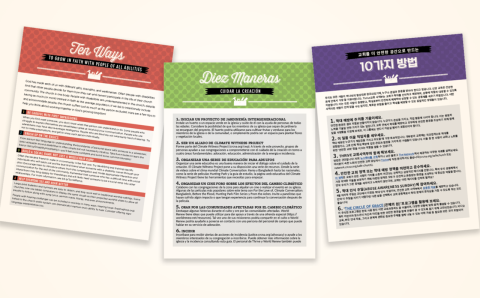It was a chilly January morning in 2024 when Ada Christian Reformed Church, a predominantly white congregation of Dutch ancestry in Ada, Mich., welcomed a Chinese family. From that day on, Calvin Theological Seminary student Matthew Sun, his wife, and their four daughters found a warm and inviting home within the congregation.
The Suns’ story is just one example of the many first- and second-generation Chinese immigrants in the area—and of newcomers from diverse backgrounds across Canada and the United States—searching for community. Some are looking for a faith community; others are simply looking for a place to belong. Churches can often be the answer.
Sun not only found community, but today he is working with Ada CRC, Resonate Global Mission, and the church’s local classis to plant a new church that can reach the Chinese diaspora in the area. He’s following in the footsteps of church planters, established congregations, and classes throughout the denomination who are stepping out to reach their neighbors by planting diverse churches that not only help meet pressing needs—but also bless the denomination by reflecting a bigger picture of God’s story.
“God is diversifying the CRC like never before, and church planting in the CRC is leading the way—leading us into a diverse, intercultural future,” said Tim Sheridan, Resonate’s Church Planting Leader.
Reaching the Chinese Diaspora in Michigan
Many Chinese immigrants have been drawn to Ada, Mich., and the surrounding area for career opportunities and the community’s school districts. That’s the easy part; finding community has been more difficult.
“Many Chinese individuals in the area feel isolated due to language barriers, cultural differences, and a lack of strong local community ties,” Sun said. “Some are international students or accompanying family members who struggle to integrate into American life. Others are new to Christianity or have no religious background. I saw the need not only for practical support and friendship, but also for gospel-centered community and discipleship.”
Since walking into Ada CRC’s doors that first Sunday, Sun has come on staff at Ada CRC and has begun the process of starting a church to reach the Chinese diaspora.
Pastor Jacob Toman said that Sun is providing a much-needed connection for Ada CRC to their community.
“As is often common, and was also a frequent part of the story of the Dutch immigrants who formed many CRC churches in the mid-20th century, Chinese immigrants and visitors seek to find connection with others who have a deep connection to their country of origin,” he said. “While English speakers have several hundred options … for the Chinese speaker, the options are much more sparse.”
With financial support, prayer, and coaching from Ada CRC, the local classis, and Resonate, Sun has been building relationships in the community. While the church is just starting, Sun and Toman both see God at work.
“We’ve seen God open doors through small things—helping students move, sharing meals, celebrating cultural holidays, and organizing events such as Taekwondo classes and language workshops,” said Sun. “These touchpoints have led to deep conversations, new friendships, and even a few individuals expressing interest in baptism or discipleship. God is using hospitality and presence to draw people into community.”
Welcoming Spanish Speakers and Arabic Speakers in Ontario
In a similar way to Sun showing up at the doorstep of Ada CRC, a group of people speaking Spanish in Milton, Ont., showed up at a thrift store started by Crosstowne (Christian Reformed) Church.
With denominational guidance and support, John Bouwers planted Crosstowne Church in Milton back in 2012 to respond to the growing population. The town, nestled just outside Toronto, has been and continues to be one of the fastest-growing communities in Canada, he said.
The church started as an English-speaking congregation, but when they started renting a space in town to expand their connections, God responded. In 2019, they started a thrift store that attracted a group of Spanish speakers who were drawn to the store’s leader and Crosstown member, Jose Luna. They asked him if he would be their pastor.
Crosstowne saw an opportunity to meet the need, and today they support both an English-speaking and a Spanish-speaking congregation. Bouwers said he sees God moving in and through these intercultural connections. The two congregations come together often for outreach events and worship services—and now they’re working on starting a third congregation of Arabic speakers.
Bouwers said that Crosstowne has grown through these intercultural relationships, noting that both their Spanish-speaking and Arabic-speaking friends have challenged their own faith: “One of the ways we see God working is … through the interchange of different cultures. For example, the churches that come from the Middle East have a much higher expectation of relationship and sharing of resources and spending time with one another,” he said.
Inviting Punjabi Speakers into a California Home
When Eric Sarwar graduated from Calvin Theological Seminary and moved to California to work toward a Ph.D. at Fuller Theological Seminary, he searched for an Indian, Pakistani, or Punjabi church—any community where he and his family could worship in their language and culture. He couldn’t find one. He connected with the Greater Los Angeles classis, and some of his friends there said they knew some Indian families in Artesia and asked if he’d like to meet them.
That’s how Artesia City Church started—three people gathering in a home. With support from the local classis, established churches, and Resonate, the church is celebrating its 10th anniversary this year with more than 30 families and 70 attendees every week.
But God had more in store. When one of the families from the church moved to Fresno for work, they found themselves in a similar position to that of Sarwar just a few years earlier. They searched for a church where they could worship in their language and culture, but found nothing. They asked Sarwar to visit them.
“To my surprise, they invited their Hindu friends,” he said. “That triggered me, and I wondered about the possibility of a church plant.”
After connecting with the local classis and Resonate, Sarwar found that the largest population of Punjabi speakers in the United States lived in Central California, and there was not a single Punjabi church. Sarwar started visiting Fresno monthly, and along with leadership established at Artesia City Church, it wasn’t long before he and his family moved to Fresno to start this new house church.
Fresno Punjabi Fellowship has become a home for Punjabi Christians, but it constantly surprises Sarwar that Hindus and Sikhs find belonging through this church as well. They have come for the relationships, food, and the worship in Punjabi, but some have found faith along the way. This past Easter, the church celebrated two baptisms.
“We are talking about global mission and reaching out to the nations—and India, the largest nation (by population), was in our neighborhood,” said Sarwar.
A Call to Plant More Churches
Back in Ontario, Bouwers shared that Crosstowne’s outreach has been, more than anything, a “God coincidence”—God bringing people to their doorstep, and the church responding to that opportunity by welcoming them. That is a sentiment reflected in Sun and Sarwar’s stories as well, and in many church plant stories.
From Ontario to California and beyond, newcomers are settling into neighborhoods across Canada and the United States. The movement comes with pressing needs for these growing diaspora communities, but also opportunities to share the gospel over a meal that reminds someone of home, through helping someone move, and through many other actions.
“At Resonate … we long to see more new churches that will demonstrate the good news of the gospel as unified and diverse communities, as foreshadows of God’s plan for a unified Church from every tribe and language and people and nation,” said Resonate’s Sheridan.
He added that a key element of the denomination’s church-planting strategic plan over the next 10 years is growing support for diaspora and diverse leaders who are planting churches with the CRC.
“For the CRCNA to fully step into the Spirit-led opportunity that is unfolding before us,” he said, “we will need strong support and greater consistency across all of our churches and classes to welcome, enfold, and develop the growing number of diaspora and diverse leaders who are seeking to church plant with our denomination.”
Toman asks us to pray for Ada CRC’s church-planting efforts, as well as for church planting across the denomination.
“Maybe it is time for your church to plant, but maybe it is time for your church to help support another church plant. Pray, use discernment, and then get moving,” he said. “The Lord has promised to build his church, and we, by God's tremendous grace, get to be part of faith coming alive in the story. Pray the Lord continues to use us together as a denomination to serve his kingdom in calling many to faith in Christ.”
Church Planting Is a Denominational Effort
It takes a denomination for a church plant to thrive. Church plants lean on local congregations and classes for prayer and financial support. Resonate’s holistic support model focuses on equipping the church planter with the tools, resources, and relationships they need, including the following:
- assessments
- coaching
- community-building partnerships
- leadership training
About the Author
Cassie Marcionetti, Resonate Global Mission









